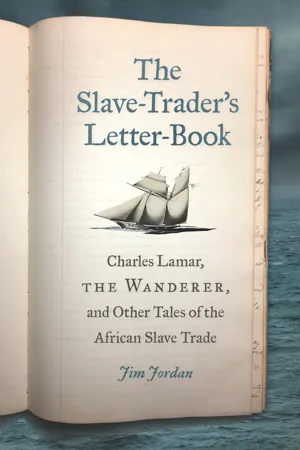
The Slave-Trader's Letter-Book
Charles Lamar, The Wanderer, and Other Tales of the African Slave Trade
- 354 pages
- English
- ePUB (mobile friendly)
- Available on iOS & Android
The Slave-Trader's Letter-Book
Charles Lamar, The Wanderer, and Other Tales of the African Slave Trade
About This Book
Long-lost letters tell the story of an illegal slave shipment, a desperate Savannah businessman, and the lead-up to the Civil War. In 1858 Savannah businessman Charles Lamar, in violation of U.S. law, organized the shipment of hundreds of Africans on the luxury yacht Wanderer to Jekyll Island, Georgia. The four hundred survivors of the Middle Passage were sold into bondage. This was the first successful documented slave landing in the United States in about four decades, and it shocked a nation already on the path to civil war. Nearly thirty years later, the North American Review published excerpts from thirty of Lamar's letters, reportedly taken from his letter book, which describe his criminal activities. However, the authenticity of the letters was in doubt until very recently. In the twenty-first century, researcher Jim Jordan found a cache of private papers belonging to Charles Lamar's father, stored for decades in an attic in New Jersey. Among the documents was Charles Lamar's letter book—confirming him as the author. The first part of this book recounts the flamboyant and reckless life of Lamar himself, including involvement in southern secession, the slave trade, and a plot to overthrow the government of Cuba. A portrait emerges at odds with Lamar's previous image as a savvy entrepreneur and principled rebel. Instead, we see a man who was often broke and whose volatility sabotaged him at every turn. His involvement in the slave trade was driven more by financial desperation than southern defiance. The second part presents the "Slave-Trader's Letter-Book." Together with annotations, these seventy long-lost letters shed light on the lead-up to the Civil War from the remarkable perspective of a troubled, and troubling, figure.
Frequently asked questions
Information
Table of contents
- Cover
- Title Page
- Copyright Page
- Dedication
- Contents
- List of Abbreviations
- Acknowledgments
- Introduction. The Journey of the Slave-Trader’s Letter-Book
- Chapter 1. The Last Laugh: December 2, 1858
- Chapter 2. “You Are a Noble Boy”: June 1838
- Chapter 3. “Young as You Are, You Are Failing Already in Mind”: 1838–1854
- Chapter 4. “I Have No Fears of the Consequences”: 1851–1856
- Chapter 5. “I Never Was So Hard Up in My Life”: 1855–1857
- Chapter 6. “An Expedition to the Moon Would Have Been Equally Sensible”: October 1857–July 1858
- Chapter 7. “Let Your Cruisers Catch Me If They Can”: April–July 1858
- Chapter 8. “As Near Perfection as Anything of the Kind”: March–September 1858
- Chapter 9. “The Degraded Children of Africa”: July–November 1858
- Chapter 10. “I Tell You Hell Is to Pay”: November–December 1858
- Chapter 11. “She Could Not Possibly Accommodate More Than Half That Number”: December 1858–January 1859
- Chapter 12. “I Am Afraid They Will Convict Me”: January–October 1859
- Chapter 13. “I Shall Simply Put an Indignity upon Him”: April–May 1859
- Chapter 14. “Tell the People of Savannah They Can Kiss My Arse”: June–October 1859
- Chapter 15. “Such Men as C. A. L. Lamar Run Riot without Hindrance”: November–December 1859
- Chapter 16. “The Wanderer Bothers Me to Death”: December 1859–May 1860
- Chapter 17. “The Most Strangely Constituted Piece of Human Nature”: May–December 1860
- Chapter 18. “I Want Dissolution”: April 1860–December 1861
- Chapter 19. “He Was a Prime Mover in Secession”: 1862–1864
- Chapter 20. A Sad Legacy: 1864–1865
- Letters of the Slave-Trader’s Letter-Book, Part A: Letters Concerning Filibustering and Slave Trading
- Letters of the Slave-Trader’s Letter-Book, Part B: Letters Concerning Miscellaneous Subjects
- Notes
- Selected Bibliography
- Index